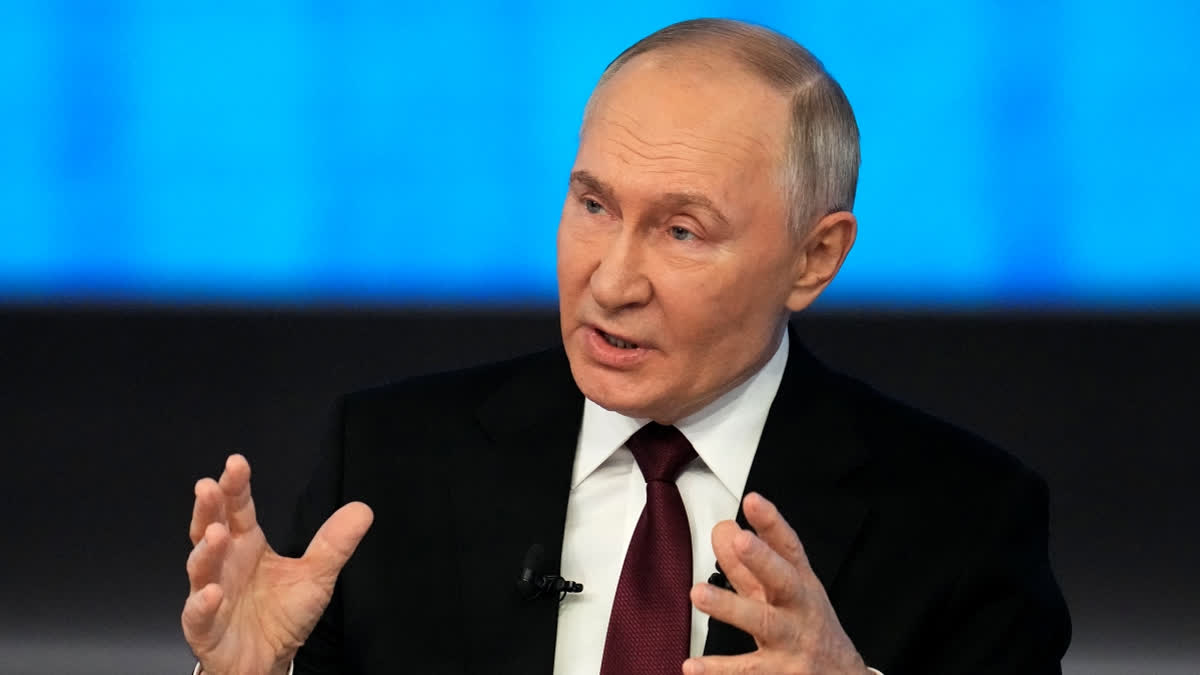Moscow: Russian President Vladimir Putin boasted about the economy and hailed his troops' gains in Ukraine during his annual news conference and call-in show Thursday, an event he uses to reinforce his authority and demonstrate sweeping control of the country’s political scene.
Putin began the tightly choreographed session by saying that Russia's economy is on track to grow by nearly 4% this year. He acknowledged that consumer prices are high, with inflation at 9.3%, but insisted that the economic situation remains “stable.” Putin, who has held power for nearly a quarter-century, also said the military was "advancing toward achieving our goals” in what he calls the special military operation in Ukraine, where his forces have made slow but steady gains.
“The situation is changing radically, we are advancing along the entire front line,” he said, asking people in the audience to unfurl a banner presented to him by marines fighting the Ukrainian forces that launched an incursion into Russia's Kursk region. That incursion has proved a major embarrassment for the Kremlin. Asked when Russian troops will drive Ukrainian forces out, Putin responded that “we will certainly kick them out” but wouldn't say how long it will take.
In response to a question about a new hypersonic intermediate-range ballistic missile that Russia used for the first time last month to strike Ukraine, Putin scoffed at claims by some Western experts that it could be intercepted by NATO's air defenses. He mockingly challenged Ukraine's Western allies to a “high-tech duel,” suggesting that Moscow could give advance notice of a strike on Kyiv with the Oreshnik missile — and see if the West could protect the city. "Let's see what happens,” he added with a smile.
Putin has said Russia's use of the Oreshnik was a response to the West granting permission for Kyiv to use their longer-range weapons for strikes on Russia. He threatened that Moscow could launch more strikes on Ukraine with the missile and warned it could also be used to target military facilities of the countries that allowed Ukraine to use their missiles for attacks deep into Russia.
In past years, the show, which is broadcast live by state-controlled TV stations across Russia’s 11 time zones, has been heavily dominated by domestic issues. Most journalists and ordinary people call the studio to ask about road repairs, utility prices, medical services and government subsidies.
Meanwhile, journalists in the hall near the Kremlin wave colorful signs and placards as they try desperately to attract Putin’s attention. But the event is particularly watched for Putin's comments on foreign affairs. Just two days before, a senior Russian general was killed by a bomb outside his apartment building in Moscow. The brazen killing of Lt. Gen. Igor Kirillov, claimed by Ukraine, brought the nearly 3-year-old conflict once again to the streets of the Russian capital.
Putin has said that Moscow stands ready for talks on a peaceful settlement to the conflict but reaffirmed his demand that Ukraine must renounce its bid to join NATO and recognize Russia’s gains. Ukraine and the West have rejected those demands. Observers will be alert for any signs of shift in the Russian leader’s bargaining position ahead of the inauguration of U.S. President-elect Donald Trump, who has pledged to negotiate a deal to end the hostilities.
Putin also made his first comments on the downfall of Syrian President Bashar Assad. The Russian leader said that he hadn’t yet met Assad, who was given asylum in Moscow, but plans to do so and will ask him about Austin Tice, an American journalist who went missing in Syria 12 years ago.
“We also can pose the question to people who control the situation on the ground in Syria,” Putin said. Assad’s demise has dealt a painful blow to Russia, which launched a military intervention in Syria nine years ago to prop up Assad’s government amid a civil war.
Moscow has quickly sought to establish contacts with the victorious rebels to secure its diplomatic and military personnel in the country and try to extend the lease on its air and naval bases in the country. Russian state media reported that ordinary citizens submitted more than 2 million questions ahead of the show.



